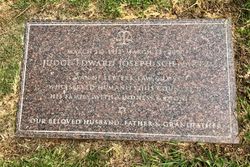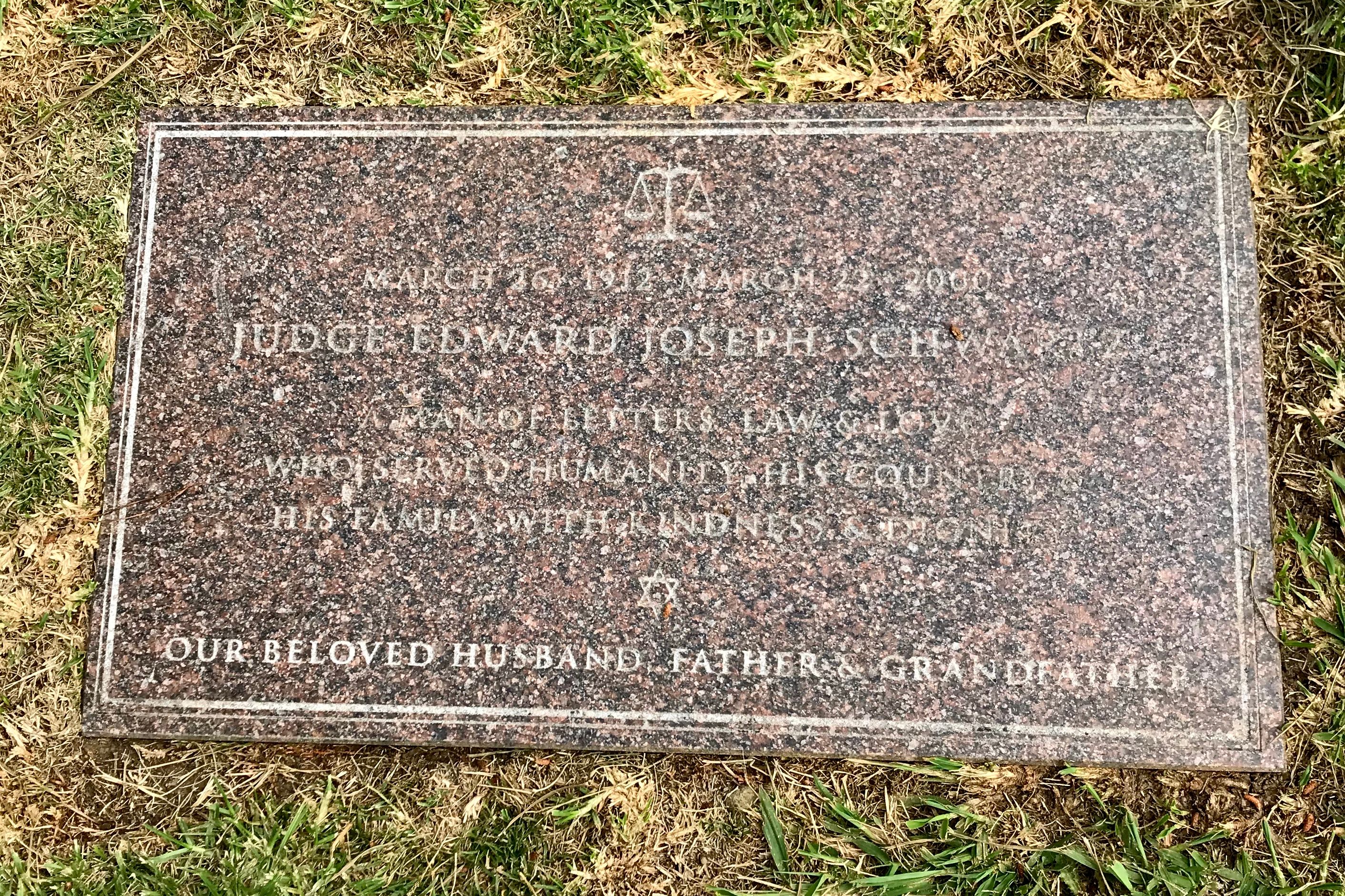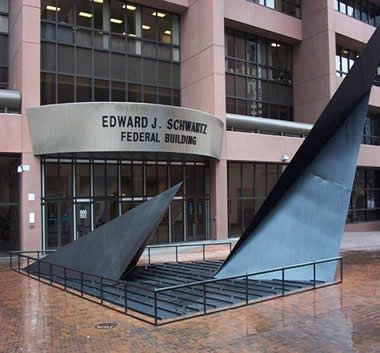San Diego Union-Tribune, The (CA) - Friday, March 24, 2000
Senior U.S. District Court Judge Edward J. Schwartz, known as a caring, conscientious jurist who at 87 was still hearing cases, died Wednesday in Scripps Mercy Hospital after a lengthy illness.
He had served on the federal bench for 32 years after his appointment in 1968 by President Lyndon B. Johnson. At the time of his death, he carried a rigorous case load of 90 civil suits, which he was presiding over until entering the hospital about two weeks ago.
His family did not disclose the nature of his illness.
"The whole court is saddened," said Presiding Judge Marilyn Huff.
She said she has lost a friend and a mentor.
"He set the tone for a very caring and compassionate but hard-working court," Huff said.
"He was known for his patience and his love of words, for his love of his wife and of his court . . . . He never had a cross word for anybody."
In 1994, the federal court building in downtown San Diego was named after Judge Schwartz. He had spearheaded the campaign to build it and watched it grow into one of the busiest federal courthouses in California.
From 1969 to 1982, Judge Schwartz served as chief judge of the district. He took over the position from Fred Kunzel, who died of a heart attack at 68.
Senior U.S. District Judge Howard B. Turrentine, who knew Judge Schwartz for more than 60 years, said that at one time they were the only U.S. district judges in San Diego. There are now 14 federal judges in the district.
In his time on the bench, Judge Schwartz presided over several controversial cases but did not allow his personal beliefs to obscure his judgment, Turrentine said.
"He never ducked a case," he said. "He took the tough cases and decided each case on its merits."
U.S. Attorney Gregory Vega said Judge Schwartz "was an outstanding judge who was fair, impartial and a true gentleman."
In one of his last high-profile cases, Judge Schwartz declined to grant a preliminary injunction in 1997 to stop three helicopter-related construction projects at Miramar Naval Air Station.
In 1996, Judge Schwartz lifted an order that had set hiring goals for blacks and Asian-Americans, eliminating affirmative action from the government work force in San Diego County.
In other well-publicized cases, Judge Schwartz:
Sentenced three former workers at National Steel and Shipbuilding Co. to six months' incarceration in 1983 for conspiring to bomb electrical transformers at the workplace.
Ended a 20-year-old legal dispute over water rights in 1988 by releasing a $17 million payment to owners of the privately held Escondido Mutual Water Co.
Presided over a sexual harassment trial in 1992 involving city planner Susan Bray and her supervisor, Robert Spaulding. Judge Schwartz threw out Bray's claim, saying it had been resolved when she accepted the city's settlement offer of $28,150.
Ruled in 1987 that a state rule forbidding the San Diego State University newspaper to editorialize on election campaigns was an abridgment of free speech.
Judge Schwartz was born in Seattle on March 26, 1912, and moved with his family to San Diego at age 3. As a youth in San Diego, he played with fellow schoolboys on the stairways of a downtown building that later became the U.S. Courthouse.
While at San Diego High School, Judge Schwartz took up boxing to fend off bullies who tried to take advantage of his slight build.
"I was a good boxer, a hell of a good boxer," he told The San Diego Union in 1982. "I used to hang out at the old Coliseum (at 15th and E streets)."
At the urging of some trainers, he considered boxing professionally, but his father resisted the idea, he said.
Judge Schwartz attended San Diego State before graduating in 1934 with a degree in English literature from the University of California Berkeley. He received a law degree from San Francisco Law School in 1939.
He began practicing law in San Diego in 1940, then joined the Navy in 1942. During World War II, after attending the U.S. Naval War College in Rhode Island, Judge Schwartz saw action off southern France and at Iwo Jima and Okinawa.
He left active duty as a lieutenant commander in 1945 and practiced law in San Diego with the firm Procopio, Price, Cory & Schwartz. He specialized in civil defense law and described himself as a liberal.
In a newspaper interview, he once said that as an attorney in private practice his aim was to gain more money for clients, but as a judge it was different.
"I think there are instances where you really perform a service to your society and your community," Judge Schwartz said.
"To me, that is the greatest experience in being a judge."
On Oct. 13, 1959, he began his career on the bench as a Municipal Court judge. In 1962, his fellow judges elected him presiding Municipal Court judge. Two years later, he was appointed a Superior Court judge.
Outside the courtroom, Judge Schwartz enjoyed tennis and cycling and was an oarsman at the San Diego Rowing Club as a young man.
"We traveled all over the world for many years," said Gertrude, his wife of more than 50 years. "Even Iran, Afghanistan and China -- before it opened relations with the U.S."
Judge Schwartz's memberships included the Sierra Club, B'nai B'rith and Blackmer Masonic Lodge.
In addition to his wife, he is survived by two daughters, Eileen Boniecka and Suzanne Friestedt, both of San Diego; a son, Stephen, of Encinitas; and three grandchildren.
Services are scheduled for 11 a.m. today at Congregation Beth Israel.
San Diego Union-Tribune, The (CA) - Friday, March 24, 2000
Senior U.S. District Court Judge Edward J. Schwartz, known as a caring, conscientious jurist who at 87 was still hearing cases, died Wednesday in Scripps Mercy Hospital after a lengthy illness.
He had served on the federal bench for 32 years after his appointment in 1968 by President Lyndon B. Johnson. At the time of his death, he carried a rigorous case load of 90 civil suits, which he was presiding over until entering the hospital about two weeks ago.
His family did not disclose the nature of his illness.
"The whole court is saddened," said Presiding Judge Marilyn Huff.
She said she has lost a friend and a mentor.
"He set the tone for a very caring and compassionate but hard-working court," Huff said.
"He was known for his patience and his love of words, for his love of his wife and of his court . . . . He never had a cross word for anybody."
In 1994, the federal court building in downtown San Diego was named after Judge Schwartz. He had spearheaded the campaign to build it and watched it grow into one of the busiest federal courthouses in California.
From 1969 to 1982, Judge Schwartz served as chief judge of the district. He took over the position from Fred Kunzel, who died of a heart attack at 68.
Senior U.S. District Judge Howard B. Turrentine, who knew Judge Schwartz for more than 60 years, said that at one time they were the only U.S. district judges in San Diego. There are now 14 federal judges in the district.
In his time on the bench, Judge Schwartz presided over several controversial cases but did not allow his personal beliefs to obscure his judgment, Turrentine said.
"He never ducked a case," he said. "He took the tough cases and decided each case on its merits."
U.S. Attorney Gregory Vega said Judge Schwartz "was an outstanding judge who was fair, impartial and a true gentleman."
In one of his last high-profile cases, Judge Schwartz declined to grant a preliminary injunction in 1997 to stop three helicopter-related construction projects at Miramar Naval Air Station.
In 1996, Judge Schwartz lifted an order that had set hiring goals for blacks and Asian-Americans, eliminating affirmative action from the government work force in San Diego County.
In other well-publicized cases, Judge Schwartz:
Sentenced three former workers at National Steel and Shipbuilding Co. to six months' incarceration in 1983 for conspiring to bomb electrical transformers at the workplace.
Ended a 20-year-old legal dispute over water rights in 1988 by releasing a $17 million payment to owners of the privately held Escondido Mutual Water Co.
Presided over a sexual harassment trial in 1992 involving city planner Susan Bray and her supervisor, Robert Spaulding. Judge Schwartz threw out Bray's claim, saying it had been resolved when she accepted the city's settlement offer of $28,150.
Ruled in 1987 that a state rule forbidding the San Diego State University newspaper to editorialize on election campaigns was an abridgment of free speech.
Judge Schwartz was born in Seattle on March 26, 1912, and moved with his family to San Diego at age 3. As a youth in San Diego, he played with fellow schoolboys on the stairways of a downtown building that later became the U.S. Courthouse.
While at San Diego High School, Judge Schwartz took up boxing to fend off bullies who tried to take advantage of his slight build.
"I was a good boxer, a hell of a good boxer," he told The San Diego Union in 1982. "I used to hang out at the old Coliseum (at 15th and E streets)."
At the urging of some trainers, he considered boxing professionally, but his father resisted the idea, he said.
Judge Schwartz attended San Diego State before graduating in 1934 with a degree in English literature from the University of California Berkeley. He received a law degree from San Francisco Law School in 1939.
He began practicing law in San Diego in 1940, then joined the Navy in 1942. During World War II, after attending the U.S. Naval War College in Rhode Island, Judge Schwartz saw action off southern France and at Iwo Jima and Okinawa.
He left active duty as a lieutenant commander in 1945 and practiced law in San Diego with the firm Procopio, Price, Cory & Schwartz. He specialized in civil defense law and described himself as a liberal.
In a newspaper interview, he once said that as an attorney in private practice his aim was to gain more money for clients, but as a judge it was different.
"I think there are instances where you really perform a service to your society and your community," Judge Schwartz said.
"To me, that is the greatest experience in being a judge."
On Oct. 13, 1959, he began his career on the bench as a Municipal Court judge. In 1962, his fellow judges elected him presiding Municipal Court judge. Two years later, he was appointed a Superior Court judge.
Outside the courtroom, Judge Schwartz enjoyed tennis and cycling and was an oarsman at the San Diego Rowing Club as a young man.
"We traveled all over the world for many years," said Gertrude, his wife of more than 50 years. "Even Iran, Afghanistan and China -- before it opened relations with the U.S."
Judge Schwartz's memberships included the Sierra Club, B'nai B'rith and Blackmer Masonic Lodge.
In addition to his wife, he is survived by two daughters, Eileen Boniecka and Suzanne Friestedt, both of San Diego; a son, Stephen, of Encinitas; and three grandchildren.
Services are scheduled for 11 a.m. today at Congregation Beth Israel.
Family Members
Sponsored by Ancestry
Advertisement
Advertisement




